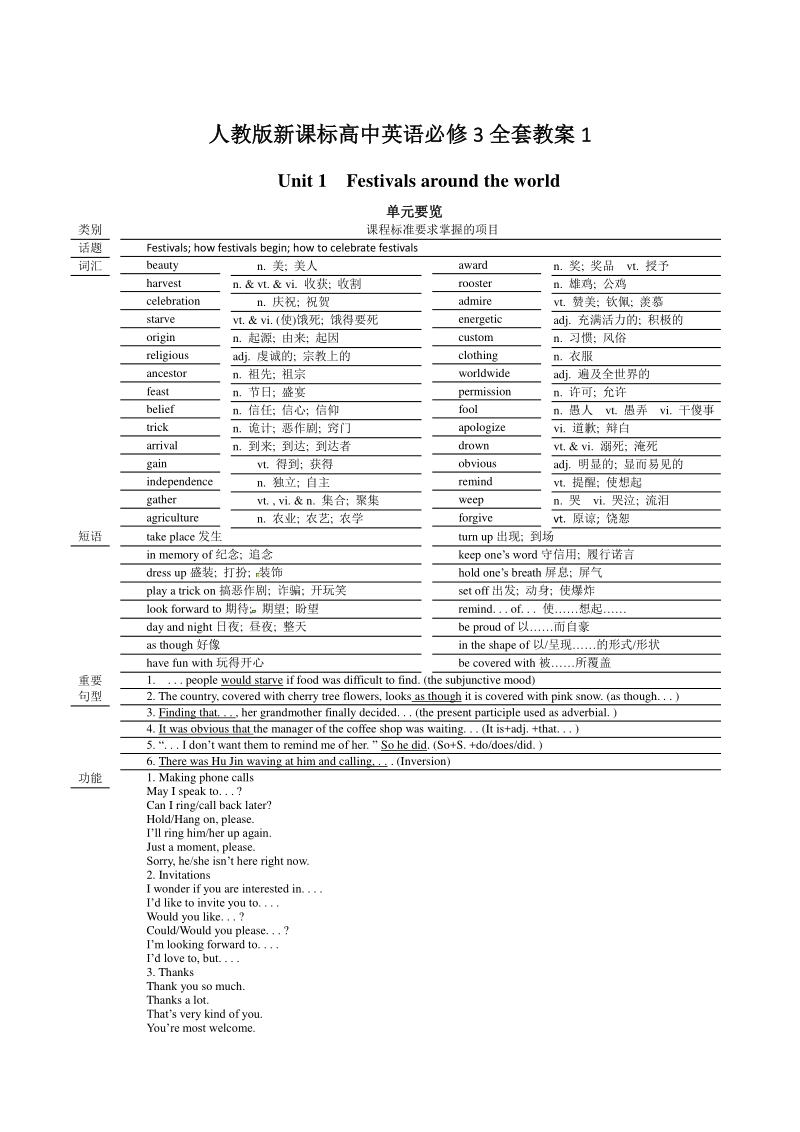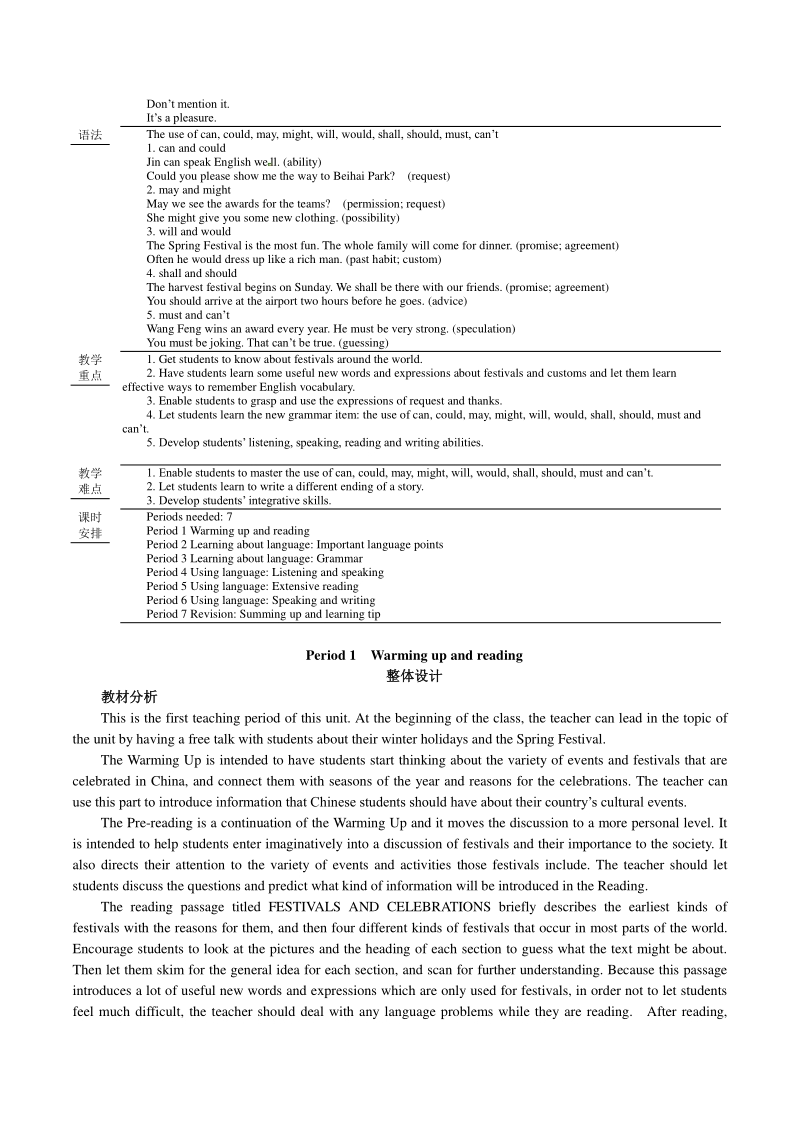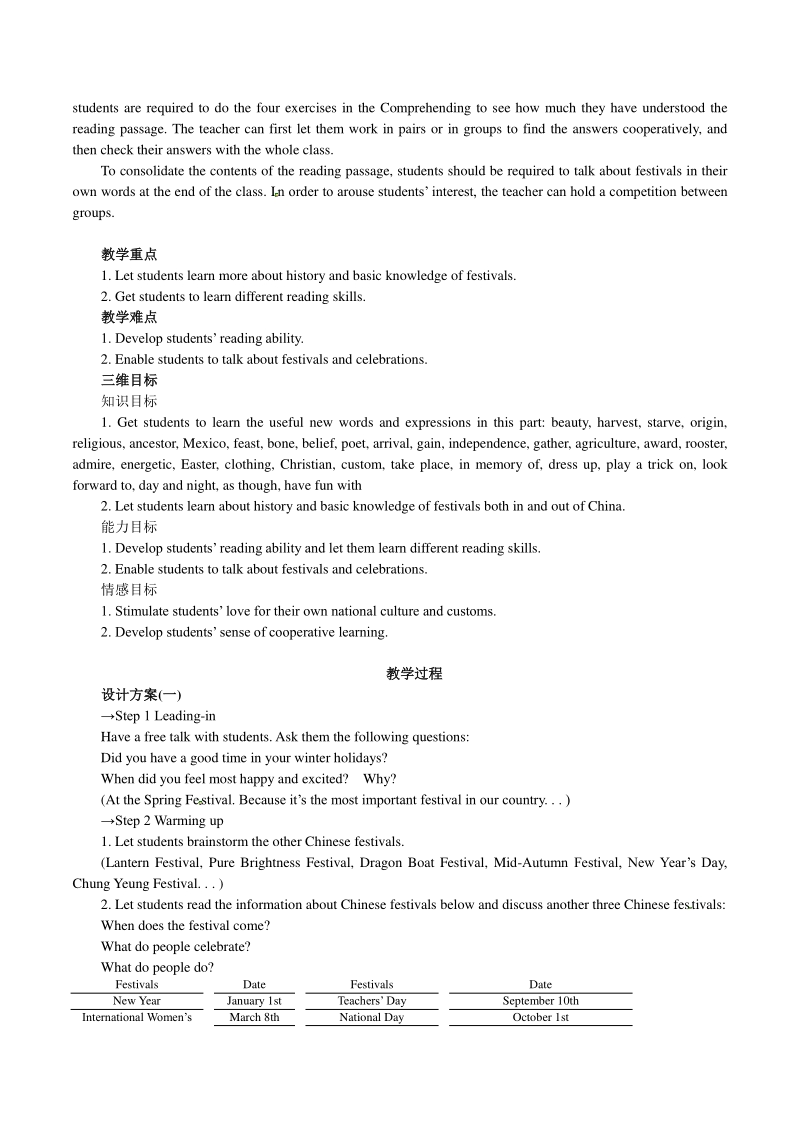 人教版新课标高中英语必修3全册教案
人教版新课标高中英语必修3全册教案
《人教版新课标高中英语必修3全册教案》由会员分享,可在线阅读,更多相关《人教版新课标高中英语必修3全册教案(176页珍藏版)》请在七七文库上搜索。
1、人教版新课标高中英语必修人教版新课标高中英语必修 3 3 全套教案全套教案 1 1 Unit 1 Festivals around the world 单元要览单元要览 类别 课程标准要求掌握的项目 话题 Festivals; how festivals begin; how to celebrate festivals 词汇 beauty n. 美; 美人 award n. 奖; 奖品 vt. 授予 harvest n. 收割 rooster n. 雄鸡; 公鸡 celebration n. 庆祝; 祝贺 admire vt. 赞美; 钦佩; 羡慕 starve vt. 饿得要死 energ
2、etic adj. 充满活力的; 积极的 origin n. 起源; 由来; 起因 custom n. 习惯; 风俗 religious adj. 虔诚的; 宗教上的 clothing n. 衣服 ancestor n. 祖先; 祖宗 worldwide adj. 遍及全世界的 feast n. 节日; 盛宴 permission n. 许可; 允许 belief n. 信任; 信心; 信仰 fool n. 愚人 vt. 愚弄 vi. 干傻事 trick n. 诡计; 恶作剧; 窍门 apologize vi. 道歉; 辩白 arrival n. 到来; 到达; 到达者 drown vt. 淹
3、死 gain vt. 得到; 获得 obvious adj. 明显的; 显而易见的 independence n. 独立; 自主 remind vt. 提醒; 使想起 gather vt. , vi. 聚集 weep n. 哭 vi. 哭泣; 流泪 agriculture n. 农业; 农艺; 农学 forgive vt. 原谅; 饶恕 短语 take place 发生 turn up 出现; 到场 in memory of 纪念; 追念 keep ones word 守信用; 履行诺言 dress up 盛装; 打扮; 装饰 hold ones breath 屏息; 屏气 play a tr
4、ick on 搞恶作剧; 诈骗; 开玩笑 set off 出发; 动身; 使爆炸 look forward to 期待; 期望; 盼望 remind. . . of. . . 使想起 day and night 日夜; 昼夜; 整天 be proud of 以而自豪 as though 好像 in the shape of 以/呈现的形式/形状 have fun with 玩得开心 be covered with 被所覆盖 重要 句型 1. . . . people would starve if food was difficult to find. (the subjunctive moo
5、d) 2. The country, covered with cherry tree flowers, looks as though it is covered with pink snow. (as though. . . ) 3. Finding that. . . , her grandmother finally decided. . . (the present participle used as adverbial. ) 4. It was obvious that the manager of the coffee shop was waiting. . . (It is+
6、adj. +that. . . ) 5. “. . . I dont want them to remind me of her. ” So he did. (So+S. +do/does/did. ) 6. There was Hu Jin waving at him and calling, . . . (Inversion) 功能 1. Making phone calls May I speak to. . . ? Can I ring/call back later? Hold/Hang on, please. Ill ring him/her up again. Just a mo
7、ment, please. Sorry, he/she isnt here right now. 2. Invitations I wonder if you are interested in. . . . Id like to invite you to. . . . Would you like. . . ? Could/Would you please. . . ? Im looking forward to. . . . Id love to, but. . . . 3. Thanks Thank you so much. Thanks a lot. Thats very kind
8、of you. Youre most welcome. Dont mention it. Its a pleasure. 语法 The use of can, could, may, might, will, would, shall, should, must, cant 1. can and could Jin can speak English well. (ability) Could you please show me the way to Beihai Park? (request) 2. may and might May we see the awards for the t
9、eams? (permission; request) She might give you some new clothing. (possibility) 3. will and would The Spring Festival is the most fun. The whole family will come for dinner. (promise; agreement) Often he would dress up like a rich man. (past habit; custom) 4. shall and should The harvest festival be
10、gins on Sunday. We shall be there with our friends. (promise; agreement) You should arrive at the airport two hours before he goes. (advice) 5. must and cant Wang Feng wins an award every year. He must be very strong. (speculation) You must be joking. That cant be true. (guessing) 教学 重点 1. Get stude
11、nts to know about festivals around the world. 2. Have students learn some useful new words and expressions about festivals and customs and let them learn effective ways to remember English vocabulary. 3. Enable students to grasp and use the expressions of request and thanks. 4. Let students learn th
12、e new grammar item: the use of can, could, may, might, will, would, shall, should, must and cant. 5. Develop students listening, speaking, reading and writing abilities. 教学 难点 1. Enable students to master the use of can, could, may, might, will, would, shall, should, must and cant. 2. Let students l
13、earn to write a different ending of a story. 3. Develop students integrative skills. 课时 安排 Periods needed: 7 Period 1 Warming up and reading Period 2 Learning about language: Important language points Period 3 Learning about language: Grammar Period 4 Using language: Listening and speaking Period 5
14、Using language: Extensive reading Period 6 Using language: Speaking and writing Period 7 Revision: Summing up and learning tip Period 1 Warming up and reading 整体设计整体设计 教材分析教材分析 This is the first teaching period of this unit. At the beginning of the class, the teacher can lead in the topic of the uni
15、t by having a free talk with students about their winter holidays and the Spring Festival. The Warming Up is intended to have students start thinking about the variety of events and festivals that are celebrated in China, and connect them with seasons of the year and reasons for the celebrations. Th
16、e teacher can use this part to introduce information that Chinese students should have about their countrys cultural events. The Pre-reading is a continuation of the Warming Up and it moves the discussion to a more personal level. It is intended to help students enter imaginatively into a discussion
17、 of festivals and their importance to the society. It also directs their attention to the variety of events and activities those festivals include. The teacher should let students discuss the questions and predict what kind of information will be introduced in the Reading. The reading passage titled
18、 FESTIVALS AND CELEBRATIONS briefly describes the earliest kinds of festivals with the reasons for them, and then four different kinds of festivals that occur in most parts of the world. Encourage students to look at the pictures and the heading of each section to guess what the text might be about.
19、 Then let them skim for the general idea for each section, and scan for further understanding. Because this passage introduces a lot of useful new words and expressions which are only used for festivals, in order not to let students feel much difficult, the teacher should deal with any language prob
20、lems while they are reading. After reading, students are required to do the four exercises in the Comprehending to see how much they have understood the reading passage. The teacher can first let them work in pairs or in groups to find the answers cooperatively, and then check their answers with the
21、 whole class. To consolidate the contents of the reading passage, students should be required to talk about festivals in their own words at the end of the class. In order to arouse students interest, the teacher can hold a competition between groups. 教学重点教学重点 1. Let students learn more about history
22、 and basic knowledge of festivals. 2. Get students to learn different reading skills. 教学难点教学难点 1. Develop students reading ability. 2. Enable students to talk about festivals and celebrations. 三维目标三维目标 知识目标 1. Get students to learn the useful new words and expressions in this part: beauty, harvest,
23、starve, origin, religious, ancestor, Mexico, feast, bone, belief, poet, arrival, gain, independence, gather, agriculture, award, rooster, admire, energetic, Easter, clothing, Christian, custom, take place, in memory of, dress up, play a trick on, look forward to, day and night, as though, have fun w
24、ith 2. Let students learn about history and basic knowledge of festivals both in and out of China. 能力目标 1. Develop students reading ability and let them learn different reading skills. 2. Enable students to talk about festivals and celebrations. 情感目标 1. Stimulate students love for their own national



- 配套讲稿:
如PPT文件的首页显示word图标,表示该PPT已包含配套word讲稿。双击word图标可打开word文档。
- 特殊限制:
部分文档作品中含有的国旗、国徽等图片,仅作为作品整体效果示例展示,禁止商用。设计者仅对作品中独创性部分享有著作权。
- 关 键 词:
- 人教版 新课 标高 英语 必修 教案
 七七文库所有资源均是用户自行上传分享,仅供网友学习交流,未经上传用户书面授权,请勿作他用。
七七文库所有资源均是用户自行上传分享,仅供网友学习交流,未经上传用户书面授权,请勿作他用。
文档标签
- 新课标语文必修一期末试卷
- 高一英语必修二
- 2021年新外研版高二英语必修二全册单词详解 返回
- 七年级英语20202021学年新课标闯关卷
- 2021人教版学年英语新课标闯关卷(二十一)(含答案
- 2021学年英语人教版新课标闯关卷(二十一)(含答案
- 2021英语学年新课标闯关卷18
- 20202021学年新课标闯关卷七年级英语下册卷二十一
- 2021人教版学年英语新课标七年级下闯关卷(二十一)(含答案
- 新课标高中化学学业水平
- 新课标3
- 人教版新课标高中英语必修1全册教案
- 人教版新课标高中英语必修三全册教案
- 人教版新课标高中英语必修5全册教案
- 人教版新课标高中英语必修五全册教案
- 人教版新课标高中英语必修4全册教案
- 人教版新课标高中英语必修四全册教案
- 人教版新课标高中英语必修一全册教案
- 人教版新课标高中英语必修3全册教案



 浙公网安备33030202001339号
浙公网安备33030202001339号
链接地址:https://www.77wenku.com/p-150927.html